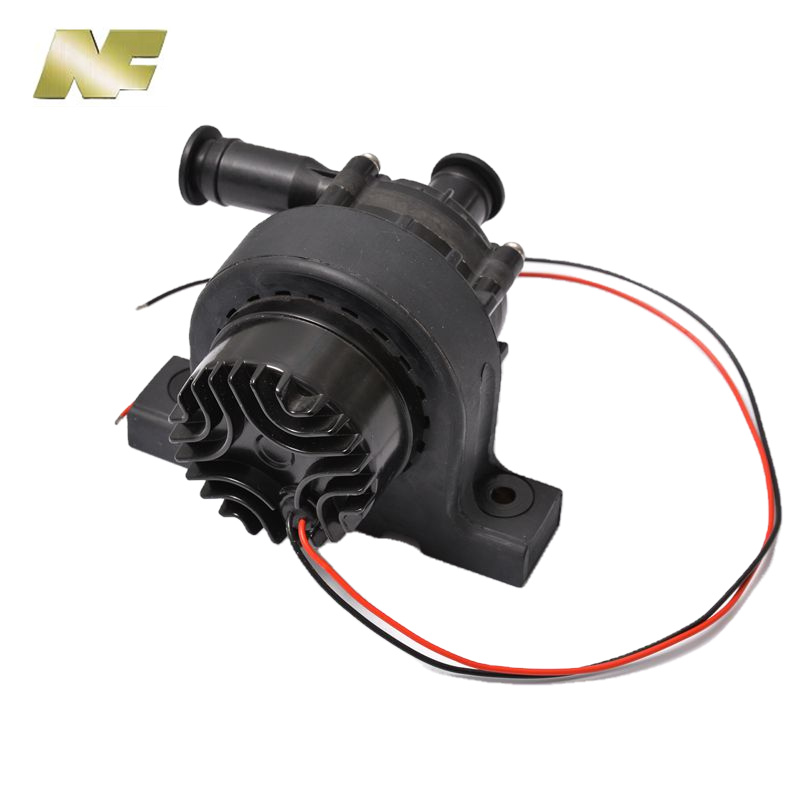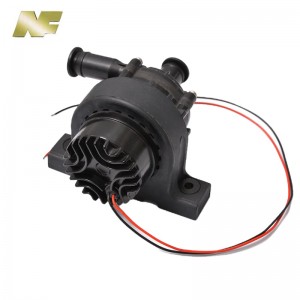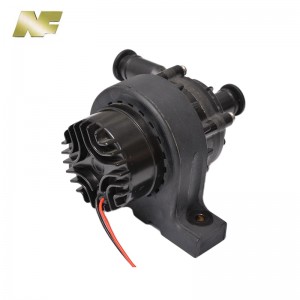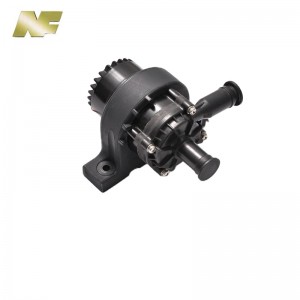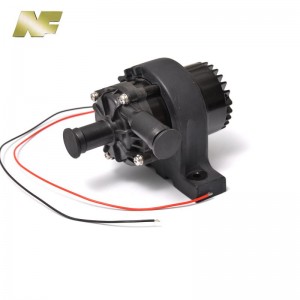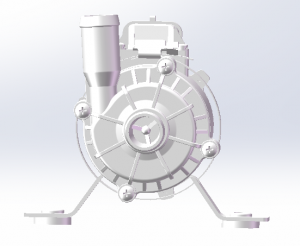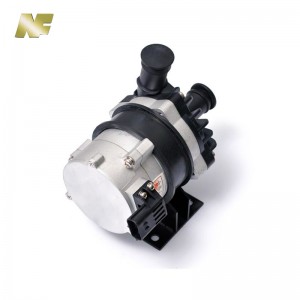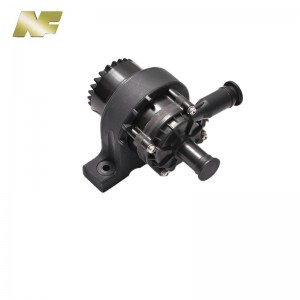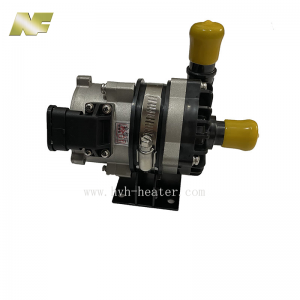NF DC12V EV Thermal Mangement Electric Water Pumps
Technical Parameter
| OE NO. | HS-030-151A |
| Product Name | Electric Water Pump |
| Application | New energy hybrid and pure electric vehicles |
| Motor Type | Brushless motor |
| Rated power | 30W/50W/80W |
| Protection level | IP68 |
| Ambient Temperature | -40℃~+100℃ |
| Medium Temp | ≤90℃ |
| Rated Voltage | 12V |
| Noise | ≤50dB |
| Service life | ≥15000h |
| Waterproofing Grade | IP67 |
| Voltage Range | DC9V~DC16V |
Product Size
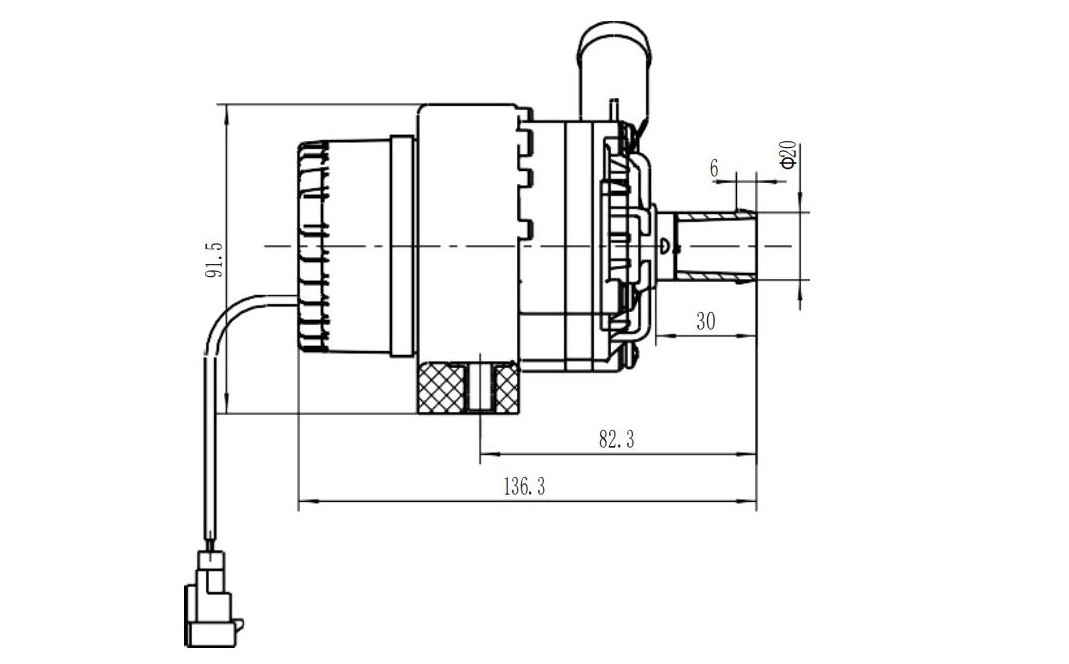
Function Description
Advantage
*Brushless motor with long service life
*Low power consumption and high efficiency
*No water leakage in magnetic drive
*Easy to install
*Protection grade IP67
Application
It is mainly used for cooling the motors, controllers and other electrical appliances of new energy vehicles (hybrid electric vehicles and pure electric vehicles).

Description
As the automotive industry embraces the electrification movement, more and more manufacturers are focusing on creating high-performance electric vehicles (EVs) that are not only energy-efficient but also environmentally friendly. The integration of advanced technologies such as high-voltage DC coolant pumps and automotive electric water pumps paves the way for revolutionary improvements in electric vehicle cooling systems, ensuring optimal performance while reducing environmental impact. In this blog, we explore how the combination of these cutting-edge technologies is reshaping the automotive industry.
The rise of high-voltage DC coolant pumps
Traditionally, internal combustion engines in conventional vehicles have relied on mechanical coolant pumps driven by engine rotation. However, with the shift to electric vehicles, there is a need to develop a new method of cooling EVs. This has led to the emergence of high-voltage DC coolant pumps, which serve as an integral part of the cooling system and ensure that the electric powertrain operates within its optimal temperature range.
High-voltage DC coolant pumps are designed to handle the high temperatures generated by electric powertrains more efficiently than mechanical pumps. These pumps are capable of operating at higher speeds, providing higher coolant flow rates and pressures, thereby enhancing cooling system performance. They are also more compact, lightweight and reliable, making them ideal for electric vehicle applications.
Benefits of car electric water pump
In addition to high-voltage DC coolant pumps, automotive electric water pumps also occupy an important position in the field of electric vehicles. These pumps are driven by electric motors and are responsible for circulating coolant within the cooling system, thereby maintaining the ideal temperature of all components.
Automotive electric water pumps offer several advantages over traditional mechanical water pumps. First, they are able to precisely control and regulate coolant flow, respond quickly to temperature changes and ensure improved cooling efficiency. Additionally, they eliminate the need for an engine-driven pump, thereby reducing load on the powertrain and thus improving energy efficiency. Finally, the absence of mechanical components reduces the risk of failure and extends the life of the water pump, thereby increasing the overall reliability of the vehicle.
Synergy: high-voltage DC coolant pump and automotive electric water pump
When high-voltage DC coolant pumps and automotive electric water pumps are combined, they create an efficient and effective cooling system for electric vehicles. The high-speed capabilities and improved coolant flow rates of high-voltage DC coolant pumps complement the precise control and modulation provided by automotive electric water pumps.
This synergy ensures the electric powertrain operates at optimal temperatures, preventing overheating and maximizing performance. By maintaining a stable temperature range, the system enables optimal battery utilization, extending battery life and improving overall energy efficiency. Additionally, this innovative combination reduces reliance on energy-consuming air conditioning systems, further increasing the range of electric vehicles.
in conclusion
The integration of high-voltage DC coolant pumps and automotive electric water pumps in electric vehicles represents an important step towards a greener and more sustainable automotive industry. These advanced technologies have revolutionized electric vehicle cooling systems, increasing energy efficiency and improving overall performance. As the electric vehicle revolution gathers momentum, automakers are embracing these innovations to shape the future of the automotive industry and drive us toward a cleaner, more sustainable future.
Our Company


Hebei Nanfeng Automobile Equipment (Group) Co., Ltd is a group company with 5 factories, that specially produce parking heaters, heater parts, air conditioner and electric vehicle parts for more than 30 years. We are the leading auto parts manufacturers in China.
FAQ
1. What is a high-voltage DC coolant pump?
A high voltage direct current coolant pump is a device used to circulate coolant in a high voltage direct current (HVDC) system. It helps remove excess heat from the system, ensuring efficient operation and preventing damage to sensitive components.
2. How does a high voltage DC coolant pump work?
These pumps typically use an electric motor to drive an impeller, creating a flow of coolant through the system. The pump may also have controls that adjust flow and pressure to ensure optimal cooling performance.
3. What are the advantages of using a high-voltage DC coolant pump?
High-voltage DC coolant pumps offer a variety of benefits, including improved heat dissipation, reduced energy consumption and increased system reliability. They are designed to meet the specific requirements of HVDC systems and operate efficiently over the long term.
4. What is the difference between a high-voltage DC coolant pump and an ordinary coolant pump?
Yes, high voltage DC coolant pumps are designed specifically for HVDC applications. They are designed to withstand higher voltage levels and provide adequate cooling while maintaining system integrity. Conventional coolant pumps may not have the features or functionality required to handle HVDC systems.
5. Where are high-voltage DC coolant pumps commonly used?
These pumps are commonly used in various HVDC applications such as power transmission systems, renewable energy projects, electric vehicles, data centers, etc. Any HVDC system that requires efficient cooling can benefit from the use of these pumps.
6. Are high-voltage DC coolant pumps safe?
Yes, high voltage DC coolant pumps are designed with safety in mind. They meet strict industry standards and undergo rigorous testing to ensure their reliability and safety. However, proper installation and maintenance procedures must be followed to ensure safe operation.
7. Can the high-voltage DC coolant pump be repaired?
If any problems arise, the high-pressure DC coolant pump can usually be repaired. However, it is recommended to consult the manufacturer or a certified service provider for repair and maintenance as these pumps require specialized knowledge and tools.
8. How to choose a suitable high-voltage DC coolant pump?
Selecting the appropriate pump depends on factors such as system requirements, flow, pressure, and compatibility with HVDC setups. It is recommended to consult an expert or manufacturer who can provide guidance based on your specific application needs.
9. What maintenance does a high-voltage DC coolant pump require?
Routine maintenance of a high-voltage DC coolant pump includes regular inspection, cleaning and lubrication. It is critical to follow the manufacturer's maintenance intervals and procedure guidelines to ensure optimal performance and longevity.
10. Can the high-voltage DC cooling pump be customized?
Yes, high pressure DC coolant pumps can often be customized to meet specific requirements. Manufacturers offer a range of options in terms of motor power, impeller size, control features and material selection. Customization allows for better integration into existing HVDC systems and optimizes cooling performance.

